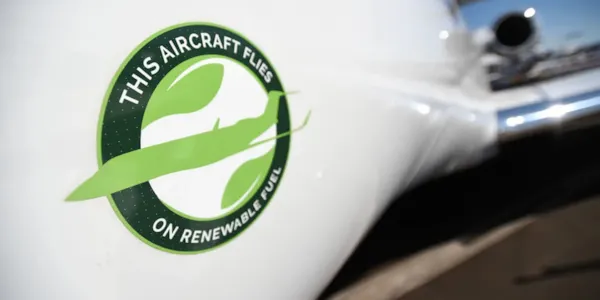IRS releases guidance on 2023 SAF fuel credit

PHOTO FROM NBAA
The IRS issued guidance on Dec. 19 for the SAF tax credit. This tax credit is a part of the Inflation Reduction Act of 2022 which was signed into law on Aug. 16.
The credit aims to push the growth and development of facilities to produce more SAF, which would increase consumer demand and lower prices for alternative fuel at airport FBOs.
Beginning Jan 1, 2023, a $1.25 per gallon credit will be available for each gallon of SAF sold as part of a qualified fuel mixture with a demonstrated lifecycle greenhouse gas (GHG) reduction of at least 50% compared to conventional jet fuel.
According to Notice 2023-06 set forth by the IRS, A qualified mixture can be produced using either a SAF synthetic blending component with kerosene or by co-processing SAF FT hydrocarbons with petroleum to produce a co-processed liquid fuel. The mixing process outlined in the notice says that it must be produced in the United States to be eligible for the SAF credit.
RELATED STORIES:
Aviation groups, airlines, fuel suppliers seek more guidance from IRS on SAF tax credits
SAF credits go into effect with the signing of the Inflation Reduction Act
The sustainable aviation fuel blenders tax credit (SAF BTC) makes SAF producers eligible for the credit. As stated in the notice, this pertains to fuel sold after Dec. 31, 2022, and before Jan. 1, 2025.
The SAF credit equals the number of gallons of sustainable fuel in a qualified mixture multiplied by $1.25, plus the applicable supplementary amount, concerning such SAF. This generally will mean the supplementary amount increases the base credit ($1.25) by $0.01 for each percentage point in which the GHG of SAF exceeds 50 percent, up to $1.75 per gallon.
The BTC will be in effect through Dec. 31, 2024. To qualify, the producer or importer of the fuel must be registered with the IRS and use a qualified mixture, like what is described in the notice.
A qualified claimant may choose how to claim the SAF credit, whether through an excise tax system or from a nonrefundable general business credit that must be included in income.
Groups like the NBAA, NATA, ALPA and AOPA were joined by aircraft manufacturers, fuel providers, airlines and other companies in signing a letter to Treasury Secretary Janet Yellen. The groups approved of the tax credit and encouraged the government to continue the initiative to help the large-scale production of SAF, providing three billion gallons by 2030.
The industry goal is for achieving net-zero emissions from airline operations by 2050. There have been many efforts to increase sustainability in aviation through alternative fuel and electric aircraft.
This tax credit is set to begin in 2023 and is set to expire in 2027.
Contact
Name: Haley Davoren
, Digital Content Manager
Company: GlobalAir.com
Website: http://globalair.com
Email: [email protected]
Phone: 502-456-3934
©2022 GlobalAir.com, Haley Davoren. All rights reserved.

Recent Comments